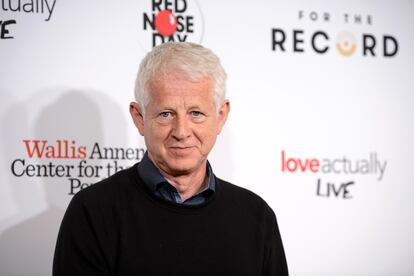Richard Curtis, screenwriter of ‘Love Actually’ and ‘Bridget Jones’s Diary,’ regrets his treatment of female characters
The director chatted with his daughter, Scarlett Curtis, 28, about his most iconic films and admitted that he regretted some decisions: ‘I feel I was unobservant and not as clever as I should have been’

The British romantic comedies of the 1990s and 2000s have a first and last name: Richard Curtis. Curtis, 66, is the screenwriter of Four Weddings and a Funeral (1994) starring Hugh Grant and Andie MacDowell; Notting Hill (1999), which tells the story of a bookseller played by Grant who falls in love with a Hollywood actress, played by Julia Roberts; and the 2001 smash hit Bridget Jones’s Diary, one of the quintessential anti-heroines of the romantic genre, who has since come under criticism. In 2003, he also wrote and directed the classic Christmas movie Love Actually.
Curtis — who was born in New Zealand and move to London when he was 11 — brings a touch of British humor to all his scripts. His movies may be romantic comedies, but they are praised for being fun and insightful, instead of sappy. EL PAÍS once described him as the “master of romantic comedies.”
However, looking back, Curtis regrets some of the decisions that he has made in his writing. Speaking at the Cheltenham Literary Festival, during an interviewed by his very own daughter, Scarlett, 28, Curtis described some of his most successful movies as “stupid and wrong” with respect to diversity.
The screenwriter laments, for example, that in Notting Hill, a film set in a neighborhood that every year celebrates an immense street carnival with Caribbean music and dances in honor of a community where “the British Black civil rights movement was born,” as in the words of his daughter, not a single person of color was included in the cast.
In the interview, Curtis said this was a mistake. “I wish I’d been ahead of the curve. Because I came from a very undiverse school and a bunch of university friends, I think that I’ve hung on to the diversity issue to the feeling that I wouldn’t know how to write those parts,” he said. “I think I was just sort of stupid and wrong about that.”
Interestingly, since gentrification of Notting Hill, today it is one of the most expensive neighborhoods in London. Its popularity began to rise precisely when Curtis decided to stage his movie there.
Richard Curtis also apologized for how some female characters were portrayed in his movies, in particular Bridget Jones’s Diary. The screenwriter and his daughter discussed the character of Bridget Jones, who was considered a feminist heroine when the movie was released, but has not stood the test of time well.
On the 25th anniversary of Helen Fielding’s best-selling book — upon which the movie is based — writer Elizabeth Egan described the novel as a “chilling, upsetting read,” pointing out Jones’ neurotic calorie counting and helplessness. “Bridget deserved better. We all did,” she wrote in The New York Times.
In the interview, Scarlett Curtis asked her father about the portrayal of “‘tree trunk thighs’ Bridget being overweight when she’s just a very skinny white woman,” played by Renée Zewellger. He replied: “I don’t feel I was malicious at the time, but I feel I was unobservant and not as clever as I should have been.”
He also addressed criticism over the portrayal of Natalie, the British prime minister’s secretary in Love Actually, who is the butt of constant jokes about Natalie’s weight.
“I remember how shocked I was five years ago when Scarlett told me, ‘You can never use the word ‘fat’ again.’ Wow, you were right. In my generation, calling someone chubby [was funny] — in Love Actually there were jokes about that,” Richard explained. “Those jokes aren’t any longer funny.”
Curtis, however, pointed out that he included a same-sex couple in Four Weddings and a Funeral, explaining that Simon Callow, who played the character Gareth, had told him that it was the first time he had been offered the role of a gay man who did not end up dying of AIDS.
Sign up for our weekly newsletter to get more English-language news coverage from EL PAÍS USA Edition
Tu suscripción se está usando en otro dispositivo
¿Quieres añadir otro usuario a tu suscripción?
Si continúas leyendo en este dispositivo, no se podrá leer en el otro.
FlechaTu suscripción se está usando en otro dispositivo y solo puedes acceder a EL PAÍS desde un dispositivo a la vez.
Si quieres compartir tu cuenta, cambia tu suscripción a la modalidad Premium, así podrás añadir otro usuario. Cada uno accederá con su propia cuenta de email, lo que os permitirá personalizar vuestra experiencia en EL PAÍS.
¿Tienes una suscripción de empresa? Accede aquí para contratar más cuentas.
En el caso de no saber quién está usando tu cuenta, te recomendamos cambiar tu contraseña aquí.
Si decides continuar compartiendo tu cuenta, este mensaje se mostrará en tu dispositivo y en el de la otra persona que está usando tu cuenta de forma indefinida, afectando a tu experiencia de lectura. Puedes consultar aquí los términos y condiciones de la suscripción digital.









































